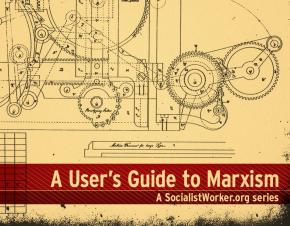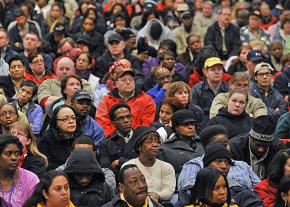What kind of party does the working class need?
considers the different models for building a working class party--and explains why revolutionaries have looked to the tradition of Lenin and the Bolsheviks.
THE QUESTION posed in the title of this article presupposes a prior question: Does the working class really need a party of its own to fight for and advance its interests?
Some on the left, particularly anarchists, are opposed to the project of party-building, arguing instead that spontaneous, diversified resistance to capitalism must be the basis for challenging exploitation and oppression.
Other left-wing initiatives in recent years have downplayed or rejected the importance of party-building as crucial to working-class emancipation. The European movement known as "autonomism," which developed in Italy in the late 1960s and is closely associated with the writing of Antonio Negri, moved away from the traditional Marxist emphasis on parties and has instead stressed spontaneous, decentralized and diverse forms of class struggle.
There was a similar deprioritizing of the role of a working-class party in the global justice movement--for example, in the World Social Forum, with its call for creating "a sustainable and inclusive world, where every person and every people has its place and can make its voice heard."
Socialists respond to such arguments by emphasizing that capitalist rule is enforced by a highly organized state, dependent on top-down political parties, which in turn are supported by a network of highly organized, ideologically driven, well-funded interest groups and the corporate media.
Only a political party organized by and dedicated to the interests of working people can hope to take on these capitalist power structures.
MODERN POLITICAL parties originated historically in the period when capitalism was consolidating its economic and political dominance. They first came into existence in Britain in the late 17th century as expressions of the rivalry between the old landowning aristocratic ruling class, represented by the Tories, and the rising capitalist bourgeoisie, represented by the Whigs.
Then and now, parties provide the main political mediation between social relations and class struggle on the one hand, and state power and government on the other.
With the consolidation of capitalism and the emergence of the modern working class during the industrial revolution of the late 18th and early 19th centuries, the prospect of workers creating a party that would represent and advocate for their needs inevitably developed. "Socialism" came into existence at the same time.
But what kind of party centered in the working class should socialists try to build?
Adherents of labor parties and of reformist socialism in the tradition of social democracy aim to build the largest, most-inclusive party possible in order to win elections and run the government.
Longstanding examples are the Labour Party in England, the Social Democratic Party in Germany and the Socialist Party in France. Such parties usually describe their politics as "center-left," and these days, they have been known to govern in coalition with centrist and even "center-right" parties.
The stated goal of social democratic parties is to protect workers from the worst kinds of capitalist exploitation and to mitigate the worst forms of discrimination and oppression generated by that exploitation.
Such reforms within capitalist society are clearly important and deserve the support of all socialists. But since they must be consistent with the continuation of capitalism--and since they can always be rolled back in periods when right-wing parties control the government--there are limits to how much even strong and successful social democratic parties can accomplish to meet working-class needs.
In periods when right-wing parties come to power on promises of aggressively serving the interests of the capitalist ruling class, social democratic parties usually adapt and compromise, instead of organizing and leading effective working-class resistance. In the current era of neoliberal domination since the 1970s, we have seen this adaptation and compromise again and again.
The British Labour Party, under left-wing leader Jeremy Corbyn and with the support of thousands of rank-and-file members, is currently trying to emerge from decades of capitulation to the priorities of the banks and multinational corporations.
The initiative driven by Corbyn is inspiring and opens up the potential for struggle and political initiatives, in society at large, and within the Labour Party itself. But sustained success remains uncertain, mainly because many of Labour's parliamentary leaders remain mired in the neoliberal "New Labor" illusions popularized by former Prime Minister Tony Blair.
More radical working-class parties with mass popular support face impossible obstacles when they attempt to govern under the terms ultimately set by the capitalist ruling class. The recent demise of Greece's SYRIZA as a radical left alternative is a sobering example.
THE MOST serious left alternative to reform socialism's project of creating a party that reflects the views of all workers and asserts power through the existing state is the revolutionary party of the Marxist tradition. This tradition is especially associated, and rightly so, with Lenin and the Bolshevik Party's leadership in the Russian Revolution of 1917.
In the Communist Manifesto, published in 1848, Karl Marx and Frederick Engels had defined the "proletarian movement" as "the self-conscious, independent movement of the immense majority, in the interest of the immense majority."
More than two decades later, in response to the socialist uprising and brief seizure of power in France known as the Paris Commune of 1871, Marx drafted a resolution for the International Workingmen's Association in London declaring that "against [the] collective power of the propertied classes the working class cannot act, as a class, except by constituting itself into a political party, distinct from, and opposed to, all old parties formed by the propertied classes."
The practical task of implementing Marx's idea of building a party "distinct from, and opposed to" all bourgeois parties became paramount for socialists at the beginning of the 20th century.
In developed countries where the working class formed a clear majority--Britain, Germany, France, the U.S.--debates among socialists about how to implement Marx's concept were unavoidable.
In Russia, a huge, economically backward country where the working class was still a minority, and yet concentrated and growing rapidly in major industrialized cities, differences about what a working-class party needed to be were especially intense.
The Bolsheviks, mainly through Lenin's leadership, emerged from these debates with a distinctive conception of what a revolutionary Marxist party needed to be if the Russian working class was to become organized enough and strong enough to overthrow not only Tsarism, but capitalism. The Bolsheviks successfully implemented Marx's foundational idea that a socialist revolution had to be the act of the working class itself.
LENIN'S CONCEPTION starts from the understanding that the political consciousness of the working class, especially in backward Russia, was mixed and underdeveloped.
The most politically developed and militant members of the working class, organized into a disciplined leadership or "vanguard" party, could provide the entire class with the leadership and an understanding of their own potential power, which could achieve and then defend a successful socialist revolution.
"The ideas of the ruling class are in every epoch the ruling ideas" in all classes, Marx argued. Lenin's idea was that workers who had broken with these ideas and developed their own critical understanding of the possibilities of human self-realization could, if organized, enable a majority of workers to do the same thing.
The Bolsheviks didn't believe that the vanguard party had all the answers and was exempt from mistakes. The party did its work, theoretically and practically, according to the principles of democratic centralism: freedom of debate and discussion, and unity in action.
Debate to decide on a course of action is essential, but must sometimes be brought to a conclusion or put on hold because the urgency of political intervention requires the active participation and commitment of every member. This makes honest, sustained and democratic critical assessment following such intervention absolutely necessary.
The Bolsheviks also realized that the vanguard party could not simply be built once the revolutionary moment had arrived--it had to be developed in advance.
Between the 1903 split of Russian socialists in which the Bolsheviks were constituted as a separate current and the October 1917 revolution--through periods of threatened extinction and internal dissension, alternating with greater struggle--membership in the party grew from a few hundred to some 240,000 on the eve of the October Revolution.
Many Bolsheviks in Petrograd and Moscow were active members of their workplace councils, or soviets--a form of mass, democratic workers' organization that emerged first in the 1905 revolution, and then again at the beginning of 1917.
The October Revolution, which overthrew the Provisional Government and seized power in the name of the soviets, was led by the Bolsheviks, who represented a clear majority of the Russian working class, including thousands serving in the Russian military.
The Bolshevik Party became the most important revolutionary socialist party in history in part because of its internal debate. Anyone who believes that party policy was simply dictated by Lenin or Trotsky needs to read accounts of party meetings before, during and after the revolution.
Balance between freedom of debate and unity in action was never easy to achieve, especially after the 1917 revolution, given the violent resistance from enemies of the revolution within Russia and beyond its borders. But it remained the Bolsheviks' framework of political leadership, at least until Lenin's death in 1924.
Eventually, the toll taken by the civil war that followed 1917--in which forces loyal to the workers' state repelled those who would over throw it, but at great cost--along with the failure of socialist revolutions in Germany, Italy and other more developed capitalist countries, led to the defeat of all that the Bolsheviks and their millions of supporters had fought for.
Stalin rose to power, consolidated support among the bureaucracy and carried out a brutal counterrevolution that cloaked itself superficially in the ideological legacy of Bolshevism. The consequences were catastrophic for people living in Russia and in all countries dominated by Stalin's dictatorship.
These consequences have also been decisive for the development of socialist politics internationally. Disagreement about the history of the Russian Revolution generally and the character and role of the Bolshevik Party more specifically have been a major source of division between reform socialist in the tradition of social democracy and revolutionary socialists who look to the Bolshevik tradition.
NOW THAT the Bernie Sanders presidential campaign in 2016 and Jeremy Corbyn's success in the recent British national election have put "socialism" back into the arena of public discussion, the historical debates about socialist organization will have to be revived and made relevant to challenging the present neoliberal disorder.
The Sanders campaign made "socialism" a positive part of U.S. political discourse to a degree that hasn't been seen since before the era of McCarthyism in the early 1950s. But despite being shoved aside by the pro-Clinton leadership after the primaries, Sanders' "People's Revolution" remains committed to the project of making the Democratic Party into an organization that puts fighting for workers first.
This is an impossible project, as many of Sanders' admirers themselves recognize. But will these activists launch an independent third party that will seriously challenge the pro-capitalist two-party system?
There is much that reformist socialists and revolutionary socialist can fight for together. But there are also critical differences, both with respect to long-term goals and to immediate practical objectives and strategies, which have to be contested, not ignored--for the good of immediate struggles as well as longer-term ones.
In his 1966 essay "The Two Souls of Socialism," Hal Draper describes a contest between "socialism from above" and "socialism from below." Now, more than half a century later, the stakes of this contest within the broader resurgence of socialist politics couldn't be higher.




